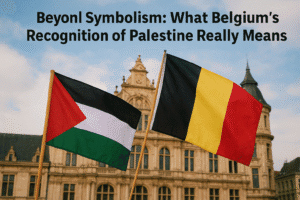Beyond Symbolism: What Belgium’s Recognition of Palestine Really Means
Belgium has announced it will formally recognize a Palestinian state, aligning with a growing European bloc including the UK and France. This move transcends symbolism, as it is coupled with tangible sanctions against Israel, notably a ban on imports from West Bank settlements. The decision forms part of a concerted strategy to pressure Israel into accepting a ceasefire and committing to a two-state solution. This European coalition is setting clear preconditions for peace, reflecting a profound impatience with the stagnant diplomatic process.
However, Israel condemns such recognition as a “reward for Hamas,” creating a deep diplomatic rift. Tragically, this high-level political maneuvering starkly contrasts with the devastating humanitarian crisis continuing in Gaza. The ultimate value of this diplomatic front will be measured by its ability to actually improve conditions on the ground.

Beyond Symbolism: What Belgium’s Recognition of Palestine Really Means
In a move that signals a profound shift in European diplomacy, Belgium has announced it will officially recognize the State of Palestine at the upcoming UN General Assembly. But this decision, articulated by Foreign Minister Maxime Prevot, goes far beyond a symbolic gesture. It is a multi-pronged strategy that couples diplomatic recognition with tangible economic pressure, marking one of the most assertive stances taken by a European nation to date.
This isn’t an isolated act. Belgium is consciously aligning itself with a new European bloc—including the UK, France, Canada, and Australia—that has moved beyond mere criticism of Israel’s actions in Gaza and the West Bank. These nations are collectively setting a new precondition for peace: a viable path to a two-state solution, and they are now using diplomatic recognition as their primary lever.
The Substance Behind the Symbol
While recognition is powerful, Belgium’s announcement of “firm sanctions” is what separates it from a purely rhetorical move. The specific measures include:
- A Ban on Settlement Imports: This directly targets the economic engine of Israeli settlements in the West Bank, which are considered illegal under international law by most of the global community. This hits where it hurts, aiming to disincentivize the expansion of these communities.
- Judicial Prosecutions: This suggests Belgium is willing to explore legal avenues, potentially leveraging universal jurisdiction principles to hold individuals accountable for actions deemed to be war crimes.
This two-pronged approach—offering Palestine the carrot of recognition while applying the stick of sanctions to Israel—reflects a deep frustration with the current Israeli government’s policies, particularly the recent announcement by Finance Minister Bezalel Smotrich of new West Bank settlements intended to “bury” the idea of a Palestinian state.
The Chorus of Diplomatic Pressure
Belgium and its allies are not acting in a vacuum. Their conditions for recognition, mirroring those laid out by UK Prime Minister Keir Starmer, form a clear checklist for Israel:
- An end to the violence in Gaza and a sustained ceasefire.
- A credible commitment to a two-state solution.
- Unrestricted humanitarian aid access.
- A halt to West Bank annexation.
The Israeli government’s response to these conditions has been consistent, dismissing them as a “reward for Hamas” that undermine negotiation efforts. This creates a fundamental impasse: one side sees recognition as a necessary step toward peace, while the other views it as an act of bad faith that empowers its adversaries.
The Sobering Ground Reality
Despite these high-level diplomatic maneuvers, the situation on the ground remains catastrophic. The staggering human cost in Gaza—with over 63,000 reported fatalities and hundreds dead from malnutrition—paints a grim picture that stands in stark contrast to the political statements in European capitals. The U.S. decision to revoke visas for Palestinian delegates attending the same UN assembly further illustrates the intense international division and the obstacles to even having a dialogue.
The Real Insight: A New European Front
The true significance of Belgium’s move is not the recognition itself—145 other nations have already taken that step. The insight is in the how and the who.
This is about the formation of a powerful, moderate European coalition that is no longer content to wait indefinitely for a peace process that has been stagnant for years. They are attempting to unilaterally change the facts on the diplomatic map to force the issue, demonstrating that international patience for the status quo has run out.
The question is no longer if more Western nations will recognize Palestine, but when. Belgium’s actions, paired with those of its allies, are creating a new diplomatic reality. However, the tragic irony remains: while diplomats debate statehood in New York, the very people they seek to empower continue to suffer in a humanitarian crisis that demands a solution more urgent than any symbolic recognition. The value of this new European front will ultimately be measured not by the statements it makes, but by its ability to translate this diplomatic pressure into a tangible improvement for the lives of Palestinians and a genuine security guarantee for Israelis.
You must be logged in to post a comment.